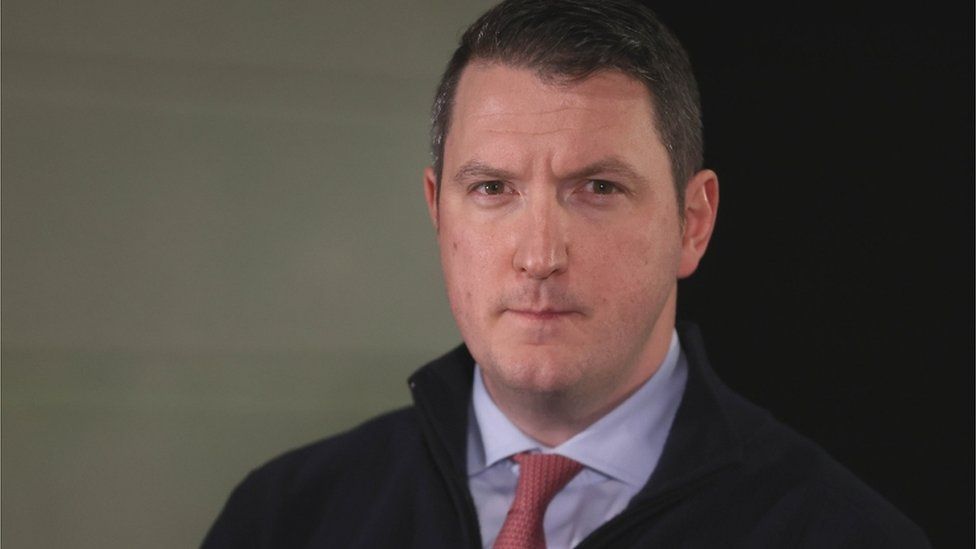
John Finucane is the MP for North Belfast
A relative of one of the victims of an IRA bomb atrocity in Coleraine nearly 50 years ago has criticised a Sinn Féin MP’s planned attendance at a “South Armagh Volunteers commemoration”.
North Belfast MP John Finucane is billed as the main speaker at the event in Mullaghbawn on Sunday.
The move has been condemned by victims and unionist politicians.
Sinn Féin has said everyone has the right “to remember their dead with dignity and respect”.
Nan Davis was among six Protestants killed in the Coleraine attack on 12 June 1973.
Her granddaughter Lesley Magee said celebrating terrorism is “a disgrace”.
“I don’t think we should be commemorating terrorism on any level, whether it be Protestant, whether it be Catholic,” she told BBC News NI.
“I have equal animosity towards both. I have no issue with anyone’s religion, whether it be Protestant, Catholic, Judaism – whatever; I don’t care.
“All I am interested in is the person that I know. But when we are celebrating terrorism, I think it is a disgrace.”
Ms Magee said she did not think Mr Finucane should be at the event on Sunday.
“I don’t think any MP should be at some kind of commemoration to celebrate a terrorist,” she added.
“I mean what did that bomb in Coleraine achieve, by killing six pensioners? What did it achieve, other than it robbed families of their loved ones?”
An event to remember those killed in the Coleraine atrocity is due to take place on Monday, and a permanent memorial to the victims will be unveiled.
Ms Magee was 10 at the time of her grandmother’s death and described the impact on the family.
“I remember vividly my mum being hysterical,” she added.
“It was just an awful time for the family.
“There were three siblings and the youngest one lived in England and he was very, very close to his mother.
“He’s still alive. He’s 80-odd now and if you were to speak to him about it now, at 80-odd he would still cry.”
Six people were killed when the bomb exploded in Coleraine in 1973
Mr Finucane’s father, solicitor Pat Finucane, was shot dead by loyalist gunmen at his home in Belfast in 1989.
A woman whose husband was shot dead by loyalists in Kennedy Way in west Belfast in January 1973 called BBC Radio Ulster’s The Nolan Show on Friday.
Mary from Lurgan, County Armagh, said Mr Finucane should “think strongly” about what he was planning to do.
“John should know exactly how I feel. I always thought at the time of his father, when we lose someone like that we have a bond with each other, we all have a bond as a victim,” she added.
“So I would love to see what John is going to say to that commemoration.
“If he has a heart at all, he should know how we feel.”
Image source, EPA
Sir Jeffrey Donaldson said Mr Finucane’s plan to go to the IRA commemoration is “wrong” and reopens wounds for victims
Democratic Unionist Party leader Sir Jeffrey Donaldson has said Mr Finucane’s plan to go to the IRA commemoration is “wrong” and reopens wounds for victims.
“The scars are still there, the broken homes remain, the broken lives are still there,” he said.
“I would simply say to John Finucane, do you believe that your attendance and participation in that event is conducive towards what we are trying to build for Northern Ireland in the future, a shared future?”
Ulster Unionist Party leader Doug Beattie has said he thought the commemoration was “scandalous”, while Taoiseach (Irish Prime Minister) Micheál Martin urged Mr Finucane not to address the commemoration, saying any attempt to “celebrate or glorify horrible deeds from the past” was not the correct way forward.
However, earlier this week Sinn Féin assembly member Conor Murphy dismissed the row as a diversionary tactic by the DUP.
“I think what we are in here is distraction politics,” Mr Murphy said.
“The real issue is here is the fact that public services are crashing round our ears.”
Image source, PA Media
Conor Murphy said the row over Mr Finucane’s attendance at a republican event in south Armagh was a DUP diversionary tactic
BBC News NI has made a number of attempts to speak to Mr Finucane about Sunday’s IRA commemoration event, but to no avail.
In a statement to BBC News NI previously, Sinn Féin said: “Everyone has the right to remember their dead with dignity and respect.
“We will continue to stand with families who have lost loved ones in the conflict.”
Last year in a BBC interview, Sinn Féin’s vice-president Michelle O’Neill said “the only way that we’re ever going to build a better future is to understand that it’s OK to have a different take on the past”.
“My narrative is a very different one to someone who has perhaps lost a loved one at the hands of republicans,” she continued.
“So I think that we need to be mature enough to say, that’s OK, we’ll have to agree to differ on that one, but let’s make sure the conditions never exist again that we find ourselves in that scenario.”







